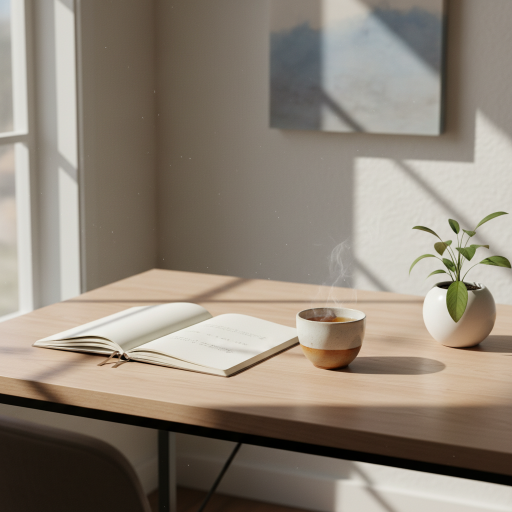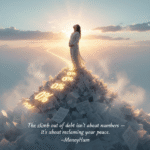The Myth of Constant Hustle

There was a time when I believed that the busier I was, the closer I was to success. I thought exhaustion was a badge of honor. Every late night, every skipped meal, every overworked morning felt like proof that I was moving toward something meaningful. But deep down, I wasn’t moving. I was spinning.
It’s strange how society has turned the idea of “being busy” into something sacred. Everywhere we look, the message is the same: keep going, keep doing, keep climbing. The world rewards the ones who never stop, or so it seems. But beneath the applause of productivity lies a quiet truth that most people don’t talk about: the hustle doesn’t always lead to fulfillment. Sometimes, it leads to emptiness.
I remember scrolling through social media one night and seeing post after post glorifying the grind: “sleep is for the weak,” “rise and grind,” “if you’re not tired, you’re not doing enough”. I nodded along, half-inspired and half-anxious, feeling like I needed to do more. That’s the hidden power of hustle culture. It doesn’t just motivate you; it manipulates you. It feeds on your fear of falling behind.
And that fear is deeply human. Psychologists call it the scarcity mindset: the belief that there’s never enough: never enough time, never enough success, never enough validation. This mindset creates a constant sense of urgency. You start to feel that if you pause for even a moment, you’ll lose your place in the race.
What we rarely realize is how this fear changes our brain. When we live in a constant state of hurry, our amygdala, the part of the brain responsible for detecting threats, becomes overactive. Our body begins to live in fight or flight mode, pumping stress hormones like cortisol and adrenaline, even when there’s no real danger. Over time, this burns out our nervous system, leaving us exhausted but restless. We call it ambition, but often, it’s anxiety wearing ambition’s mask.
I’ve learned that hustle culture thrives on comparison. We start measuring our value not by what we create, but by how much we produce. We start comparing our quiet progress with someone else’s loud highlight reel. We become so obsessed with speed that we forget to ask if we’re even heading in the right direction.
When I was living in that constant rush, I told myself I was in control. But in truth, I was controlled by fear, by expectation, by the invisible voice that whispered, “If you slow down, you’ll lose everything”. It’s painful to admit, but there’s a kind of loneliness that comes with always hustling. You start missing out on simple joys: having dinner without checking your phone, sitting in silence without guilt, walking without feeling like it’s a waste of time. Your mind begins to equate stillness with failure. And the more you run, the more life runs past you.
One night, I remember waking up at 3 a.m., heart racing, and checking my emails in the dark. There wasn’t any real reason: no emergency, no deadline. It was pure reflex. That small, almost absurd moment showed me how deeply hustle had rewired my brain. My body was awake, but my soul was exhausted. The next morning, I looked at myself in the mirror and barely recognized the person I’d become: someone constantly chasing but never arriving.
I started asking myself a difficult question: What if everything I’m doing is not actually bringing me closer to happiness, but further away from it? That question became the seed of my transformation. Because the truth is, hustle isn’t really about productivity; it’s about fear of stillness. The silence we avoid is often where we’d have to face our own doubts, our insecurities, our unmet needs. Working constantly becomes an escape. We convince ourselves that if we keep moving, we won’t have to feel. But we can’t outrun ourselves forever.
When I began to slow down, truly slow down, it felt terrifying at first. I felt guilt, anxiety, and even shame. Society had conditioned me to equate rest with weakness. But as I stayed with that discomfort, I began to see what I had been missing. I noticed the way sunlight looked on my desk in the morning. I heard my own thoughts again. I began to dream differently: not in numbers or deadlines, but in feelings.
Science supports this too. When we slow down, our body shifts from the sympathetic (fight or flight) to the parasympathetic nervous system, the mode responsible for rest, healing, and creative thinking. In that state, our brain begins to repair itself. Cortisol levels drop. Blood pressure stabilizes. The fog starts to lift. And then something quiet but profound happens: you begin to think clearly again.
That’s when I realized the greatest myth of hustle is that it promises freedom but delivers the opposite. It chains you to constant urgency. It keeps you trapped in what psychologists call the achievement treadmill, where every goal reached only fuels the pressure to achieve more. True freedom, I discovered, isn’t found in doing everything. It’s found in choosing what truly matters. It’s saying no when your heart whispers that it’s time to rest. It’s trusting that slowing down doesn’t mean falling behind; it means finally aligning with your own rhythm.
We’ve all been taught to chase life like it’s running away from us. But life isn’t something to chase; it’s something to notice.
So if you’re tired, not just physically, but deep down in your soul, please know this: you’re not lazy, and you’re not broken. You’re simply tired of running from yourself. And that’s okay. You don’t need to fix that feeling; you need to honor it. Because sometimes the most powerful step you can take is to stop running. And in that stillness, you begin to see that what you’ve been chasing all along: peace, fulfillment, meaning, was never out there. It’s been waiting patiently within you, hoping you’d slow down long enough to notice.
Why Deep Focus Creates Leverage
When I first tried to slow down, I didn’t know what to do with the quiet. My hands would reach for my phone out of habit, my thoughts would scatter, and I’d feel this strange urge to fill the stillness with something, anything. I had been so used to being busy that calm felt uncomfortable.
But with time, I began to notice that something magical happens when you stop trying to do everything and start giving your full attention to one thing at a time. It’s almost like life begins to breathe with you again.
There’s a deep kind of power hidden in focus, not the kind of focus that’s fueled by deadlines or pressure, but the kind that arises from presence. The kind where your mind, body, and heart are all aligned toward one direction. That kind of focus is what creates leverage, not the mechanical kind you find in productivity books, but a spiritual leverage that turns effort into flow.
I remember the first time I truly experienced this. I had decided to dedicate a few quiet hours to a single task: no notifications, no multitasking, no music, no distractions. For the first fifteen minutes, my mind screamed for stimulation. But then, something shifted. My thoughts slowed down. My breathing softened. My awareness deepened. I felt myself sink into the work so completely that time dissolved.
When I finally looked up, three hours had passed, yet it felt like thirty minutes. What I had accomplished in that time was not just more than usual; it was better, cleaner, deeper. That was the day I began to understand what psychologists call the flow state. Flow is a mental state where you’re fully immersed in what you’re doing, where your sense of self fades and only the task remains.

In this state, the brain releases dopamine, endorphins, and norepinephrine, chemicals that heighten focus, enhance creativity, and increase motivation. Your prefrontal cortex (the part responsible for self-criticism and doubt) temporarily quiets down, allowing intuition and creativity to take over. It’s not about working harder. It’s about working in harmony with your mind’s natural rhythm. But to enter this state, your brain needs space, space that hustle culture rarely allows.
You see, every time we switch tasks: jumping from one project to another, checking messages between deep work, we experience what researchers call attention residue. A part of our mind remains stuck on the previous task, making it harder to fully focus on the next one. This constant switching drains mental energy and fragments our attention. That’s why multitasking feels productive but actually reduces efficiency. Our brain isn’t wired to handle multiple cognitive loads at once. When we force it to, our focus becomes shallow, and so does our output.
Deep focus, on the other hand, works like sharpening a blade. The less you divide your attention, the more powerful it becomes. The world may tell us to be everywhere at once, but our mind thrives when it’s fully in one place.
Over time, I began to schedule my days differently. Instead of trying to fill every hour, I began protecting time: sacred blocks of focus. I treated them as quiet appointments with my own potential. No one else was invited. And I noticed something almost spiritual in that discipline. I wasn’t just doing work; I was building a relationship with attention itself.
Attention, when given fully, is love in its purest form. Whether it’s work, art, or conversation, when you give something your complete focus, it grows.
In those moments of deep work, I also began to see how easily we scatter ourselves in daily life. Our mind jumps from one tab to another, one thought to another, one worry to another, until we’re spread so thin that we forget what it feels like to be whole. But focus heals that fragmentation. It gathers all those scattered pieces of our attention and brings them back home.
In psychological terms, deep focus increases dopaminergic regulation: the balance of motivation and reward in the brain. When we finish a deeply focused task, the brain gives us a healthy sense of satisfaction. It’s not the anxious high of a notification or the temporary rush of multitasking. It’s calm pride, the kind that roots confidence deep in your nervous system.
I began to realize that deep focus is also emotional healing. When you give your full attention to something meaningful, you stop chasing validation. You no longer seek distractions to fill emotional voids. You find quiet joy in being fully here. That’s when your work stops feeling like a burden and starts feeling like an expression of self.
That’s also where leverage begins. Leverage is when one small, intentional act creates an outsized impact. It’s when you stop wasting time on the unnecessary and begin investing it in what truly matters. A single focused hour can often accomplish what ten scattered hours never could. It’s why the calm mind always wins. Because clarity is leverage. Presence is leverage.
There’s a beautiful quote that says, “The depth of your presence determines the quality of your results”. I’ve found that to be deeply true. The moment I started focusing less on doing more and more on being deeply engaged with one thing at a time, my creativity multiplied. My relationships improved. Even my conversations became richer.
This shift also changed how I saw time. I used to see time as something I needed to manage, something I was constantly running out of. But now, I see time as something that expands or contracts based on my awareness. When I am deeply focused, an hour feels abundant. When I’m distracted, a whole day slips away without meaning.
Science supports this too. Studies show that deep focus increases the brain’s efficiency, reduces neural noise, and enhances memory retention. It literally rewires your brain for clarity.
But perhaps the greatest gift of deep focus is not productivity; it’s peace. Because when you are truly focused, you’re not in the past or the future. You’re here, in this moment, fully alive. And that’s what we’ve all been searching for, beneath all the chasing and doing: the feeling of being here, now.
So when people say “do less to earn more,” I don’t think they’re only talking about money or success. They’re talking about meaning. When you give yourself permission to focus deeply, you’re not just earning better results; you’re earning yourself back from the noise. And once you’ve tasted that peace, you’ll never want to live on the surface again.
Redefining Productivity as Precision
There came a time when I began to question what “being productive” even meant. For years, I had used the word as a compass: if I was productive, the day was good; if not, I felt guilty. But slowly, I began to realize that most of my so called productive days weren’t really fulfilling. They were just filled. I had mistaken motion for meaning.
The more I reflected, the clearer it became that the modern idea of productivity has drifted far from its original purpose. We think productivity means doing as much as possible, squeezing every second of the day. But real productivity isn’t about movement; it’s about direction. It’s not about volume; it’s about precision.
Our brains are miraculous, capable of focus, creativity, intuition, and emotion, yet they’re also fragile when overloaded. When we constantly switch tasks or force ourselves into endless activity, we drown the mind in what psychologists call cognitive load. It’s like trying to pour a river through a straw. We may get something through, but most of the energy is lost as friction. That’s why, at the end of an overstuffed day, we often feel strangely empty. The brain has been active, but not effective. It’s been busy, not meaningful.
True productivity feels different. It feels quiet, deliberate, and deeply satisfying. It’s not the thrill of rushing from one task to another but the calm certainty of knowing that what you did today truly mattered. Over time, I began to understand that the key to this kind of productivity lies in precision: in doing fewer things, but doing them with such clarity and presence that their impact multiplies.
There’s a profound shift that happens when you stop asking, “How much did I do today?” and start asking, “What mattered most today?”.
Psychologists studying attention call this the selective attention principle. It’s our brain’s ability to focus on what’s relevant and ignore the rest. The more refined this ability, the more energy we preserve for the work that counts. Every unnecessary task we remove is like removing static from a frequency: what remains is pure signal.
And this isn’t just a work principle. It’s a life principle. Precision in life means saying no to things that drain your energy and yes to things that nourish it. It means giving your time to relationships that uplift you rather than those that leave you anxious. It means crafting your days not as endless lists, but as intentional experiences.
When I began practicing this, I noticed something unexpected: I started feeling lighter. My days became less crowded but more complete. The anxiety of “not doing enough” began to fade because I knew that what I was doing was aligned with my deeper purpose. It’s amazing how much peace comes when you stop treating every moment as a race.
In neuroscience, there’s a concept called the default mode network (DMN): the part of the brain that activates when we’re not focused on a task. It’s often associated with mind wandering and self reflection. When we slow down and allow mental space, the DMN helps us process experiences, form insights, and connect ideas. That’s why our best thoughts often come in the shower, during walks, or when we stop trying so hard to think.
The constant hustle suppresses this network, keeping the mind trapped in surface level thinking. But when we allow stillness, precision naturally emerges. We begin to see connections we never noticed before.
In essence, slowing down sharpens the mind’s lens. Think of an artist painting a canvas. If the brush moves too fast, the details blur. Precision requires stillness: a certain patience between strokes. Life works the same way. If we move too fast, we lose the texture of experience.
I began creating what I call “precision rituals”. Simple practices that remind me that life’s richness comes from attention, not acceleration.

One of my favorites is something I do every morning: before opening my phone, I write down one question: “What is the single most important thing I can do today that will matter to my future self?”. Not the most urgent thing. Not the easiest. But the one that feels meaningful. That question acts like a compass, pointing me toward precision. It filters noise from necessity.
Another ritual I follow is protecting “empty hours”. I intentionally keep some parts of my day unscheduled. At first, it felt strange, almost irresponsible. But those empty hours turned into breathing space for the mind. They allowed me to think deeply, to feel again, and to notice the small details that give life its warmth: the sound of rain, the taste of morning coffee, the quiet hum of being alive. That space is where clarity lives.
Physiologically, this balance matters too. When we work in constant urgency, we activate the sympathetic nervous system, responsible for the body’s stress response. It keeps us alert but also tense, anxious, and fatigued. Rest and focus, on the other hand, engage the parasympathetic system, the body’s mode for repair and creativity. This is where ideas bloom naturally, without strain.
Doing less isn’t about avoiding responsibility; it’s about returning to rhythm. The human mind, like nature, thrives in cycles: periods of effort followed by periods of renewal. Without that rhythm, even the strongest will burns out.
Over time, I learned to see productivity not as an outcome, but as a reflection of alignment. When my mind, body, and purpose were aligned, I could do more in a few hours than I once did in entire days of rushing. That’s when I realized that precision is not about perfection; it’s about presence.
Precision means pouring your full awareness into what you’re doing, even if it’s small. It’s writing an email with care instead of haste. It’s listening to someone without checking your phone. It’s cooking a meal slowly, tasting the process rather than rushing to the outcome. The psychology of fulfillment is rooted in this: when we give our complete presence, even ordinary tasks begin to feel sacred.
In those quiet moments of precision, something inside us heals. The mind stops scattering. The body relaxes. Time stretches. We return to ourselves.
And the most beautiful part? Precision naturally brings abundance. Because when you live with focus and clarity, the results of your efforts compound. You stop wasting energy on the unnecessary and start channeling it into what truly moves your life forward. You begin to see that real productivity isn’t about managing time; it’s about managing energy. It’s about choosing where your life force flows.
The day you understand that, your definition of success changes forever. It’s no longer about how much you accomplish, but how aligned your actions are with your truth. It’s no longer about checking boxes, but about living meaningfully. That’s the quiet revolution of doing less. It replaces the endless noise of achievement with the serene melody of precision. And in that melody, you begin to rediscover what it means to truly live.
Lessons from Minimalists and Slow Workers
There’s a quiet wisdom that exists in people who live and work slowly. You can see it in artists who spend years on a single painting, in gardeners who tend the soil as if speaking to it, or in writers who wait for their sentences to ripen before they appear on the page. They move through life as if time itself is elastic: not something to chase, but something to inhabit.
For a long time, I used to envy that kind of calm. I thought it was a luxury reserved for people with simpler lives. But the more I studied the psychology of focus and fulfillment, the more I understood that this slowness wasn’t a lack of ambition; it was a different kind of mastery.
Minimalists and slow workers have learned what most of us forget: depth requires stillness. When you slow down, your attention deepens. And when your attention deepens, everything you do gains weight.
Think about how a musician tunes an instrument before performing. That single act of pausing, adjusting, and listening ensures harmony. The same applies to our work and our lives: the pause is not the absence of progress; it’s the preparation for precision.
The Japanese have a beautiful term for this: “Ma”, which means the space between things. It’s the silence in music, the pause between breaths, the distance that gives form to beauty. Without that space, everything becomes noise.

We live in a world terrified of “Ma”. We fear pauses. We fill every silence with notifications, every gap with scrolling, every moment of stillness with stimulation. But the mind, much like the body, needs rest between its movements. Otherwise, it breaks down quietly from the inside: not from exhaustion, but from lack of presence.
I once read about the ceramic masters of Mashiko, Japan. They work slowly, sometimes letting clay rest for days between shaping and firing. When asked why, one craftsman replied, “Because the clay needs to breathe. If I rush it, it will crack”. That sentence stayed with me. Because it’s true for us, too. If we rush ourselves: our work, our decisions, our dreams, we crack. Maybe not visibly, but internally. We lose texture. We lose patience. We lose the quiet joy that once made the process worth it.
The minimalist philosophy teaches something radical in its simplicity: less allows more to live. By removing what is unnecessary: clutter, noise, overcommitment, we give space for what is essential to flourish. It’s not just about decluttering your desk or deleting apps; it’s about decluttering your attention.
In psychology, there’s a term called attentional restoration theory. It suggests that exposure to calm, undemanding environments, like nature, art, or silence, replenishes our cognitive capacity. The mind, when relieved from constant decision making, heals itself. This is why long walks or quiet mornings can make you feel sharper than hours of caffeine ever could.
The slow workers of the world: the gardeners, potters, craftsmen, writers, they understand this intuitively. Their pace is not laziness; it’s wisdom. They know that creation has its own seasons, just like the earth. You cannot rush spring. You can only prepare for it.
One of the most powerful shifts I’ve experienced is realizing that doing something slowly doesn’t make it less valuable; it often makes it sacred. When you write slowly, your words begin to breathe. When you cook slowly, you taste the soul of food. When you listen slowly, you hear the truth between the words. Slowness restores meaning.
There’s also something deeply human about imperfection that slow living honors. When you work fast, you chase flawless efficiency. But when you slow down, you begin to notice beauty in irregularity: the way handmade pottery is slightly uneven, or how an old wooden table carries marks of use. In Japanese aesthetics, this is called Wabi sabi: the beauty of imperfection and impermanence. We, too, are works of Wabi sabi. Constantly changing, slightly incomplete, but deeply authentic when seen closely.
And maybe that’s what slowing down really means: returning to authenticity.
When I began embracing this rhythm, I noticed something subtle but profound: my sense of time changed. Hours no longer felt like something to conquer but something to live within. I stopped counting the minutes and started feeling them.
Even my work improved. The fewer things I did, the better they became. I found myself writing with more heart, thinking with more depth, connecting with more sincerity. The quality of life rose quietly, without any dramatic overhaul: simply by doing less, but doing it with care.
In the world of neuroscience, this state is closely tied to flow: the mental zone where concentration feels effortless, where we lose track of time because we’re fully absorbed. Flow doesn’t come from rushing. It comes from presence. And presence blooms when we are unhurried.
Slow workers, minimalists, monks, artists: they all operate in this rhythm of flow. It’s not the speed that gives them mastery; it’s their intimacy with what they do.
I think the future will belong to the slow ones. Because in an age of constant noise, focus will become the rarest currency. Attention will be wealth. And those who can protect their inner stillness will live the richest lives: not in money or fame, but in meaning.
Perhaps that’s the quiet revolution we need: not to do more, but to be here fully. To give each moment its due presence. To find joy not just in the result, but in the rhythm of becoming.
A Gentle Reflection
If there’s one lesson this journey has taught me, it’s that focus is not a discipline; it’s a form of love. Love for what you do. Love for how you live. Love for being awake in your own life.
We often think fulfillment comes from grand achievements or life changing events. But fulfillment, in truth, is found in the subtle: in the way sunlight falls on your desk while you work, in a deep conversation that leaves you silent for a moment, in the satisfaction of doing one thing with your whole heart.
When you slow down enough to notice those things, life stops being something to manage and starts being something to experience. And maybe that’s the ultimate form of productivity: not measuring how much we did today, but how deeply we lived it.

So the next time you catch yourself rushing through your day, pause. Take a breath. Feel your own presence returning. Because right there, in that small moment of awareness, you’ve already begun to live the slow path to focus: the path where attention becomes peace, and simplicity becomes freedom.
Afterword: A Letter for the Tired Heart
If you’re reading this, maybe you’ve been trying very hard. Maybe you’ve been giving your all: to your work, to your dreams, to people you love, and yet still feel like it’s never enough.
I know that feeling. The weight that sits in your chest when the world tells you to go faster, when your worth feels tied to how much you can produce. But you are not a machine. You are a breathing, feeling, thinking being. You are allowed to rest.

I’ve come to believe that the greatest courage in our time is not to hustle harder but to choose gentleness in a world that worships pressure. It takes courage to close your laptop before midnight. It takes strength to say no to what drains you. It takes wisdom to realize that peace is not found at the finish line; it’s built in every small act of awareness along the way.
If there’s one thing I hope you take with you from these words, it’s this: you are not behind. You are exactly where you are meant to be. Every moment of rest you give yourself, every time you breathe deeply and come back to the present, you are healing something that hustle tried to break.
The world may measure success in speed, but life measures it in presence. So take your time. Do fewer things, but do them with love. Let yourself be slow, tender, and real. Because in the end, what truly earns more: more peace, more creativity, more joy, is not constant doing, but conscious being. And that, I think, is the quiet art of living well.
“True freedom isn’t found in doing everything — it’s found in choosing what truly matters.”
If you’ve read this till the end, thank you❤️
With love,
Your Dearest Friend,
Chitraansh







